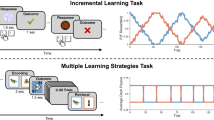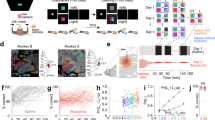Abstract
The cerebellum has recently been discussed in terms of a possible involvement in reward-based associative learning. To clarify the cerebellar contribution, eight patients with focal vascular lesions of the cerebellum and a group of 24 healthy subjects matched for age and IQ were compared on a range of different probabilistic outcome-based associative learning tasks, assessing acquisition, reversal, cognitive transfer, and generalization as well as the effect of reward magnitude. Cerebellar patients showed intact acquisition of stimulus contingencies, while reward-based reversal learning was significantly impaired. In addition, the patients showed slower acquisition of new stimulus contingencies in a second reward-based learning task, which might reflect reduced carry-over effects. Reward magnitude affected learning only during initial acquisition, with better learning on trials with high rewards in patients and control subjects. Overall, the findings suggest that the cerebellum is implicated in reversal learning as a dissociable component of reward-based learning.





Similar content being viewed by others
References
Delgado MR (2007) Reward-related responses in the human striatum. Ann N Y Acad Sci 1104:70–88
Schultz W (2007) Behavioral dopamine signals. Trends Neurosci 30(5):203–210
Delgado MR, Locke HM, Stenger VA, Fiez JA (2003) Dorsal striatum responses to reward and punishment: effects of valence and magnitude manipulations. Cogn Affect Behav Neurosci 3(1):27–38
Delgado MR, Nystrom LE, Fissell C, Noll DC, Fiez JA (2000) Tracking the hemodynamic responses to reward and punishment in the striatum. J Neurophysiol 84(6):3072–3077
O’Doherty J, Dayan P, Schultz J, Deichmann R, Friston K, Dolan RJ (2004) Dissociable roles of ventral and dorsal striatum in instrumental conditioning. Science 304(5669):452–454
Yacubian J, Glascher J, Schroeder K, Sommer T, Braus DF, Buchel C (2006) Dissociable systems for gain- and loss-related value predictions and errors of prediction in the human brain. J Neurosci 26(37):9530–9537
Seymour B, Daw N, Dayan P, Singer T, Dolan R (2007) Differential encoding of losses and gains in the human striatum. J Neurosci 27(18):4826–4831
Bellebaum C, Koch B, Schwarz M, Daum I (2008) Focal basal ganglia lesions are associated with impairments in reward based reversal learning. Brain 131:829–841
Cools R, Barker RA, Sahakian BJ, Robbins TW (2001) Enhanced or impaired cognitive function in Parkinson’s disease as a function of dopaminergic medication and task demands. Cereb Cortex 11(12):1136–1143
Cools R, Clark L, Owen AM, Robbins TW (2002) Defining the neural mechanisms of probabilistic reversal learning using event-related functional magnetic resonance imaging. J Neurosci 22(11):4563–4567
O’Doherty J, Kringelbach ML, Rolls ET, Hornak J, Andrews C (2001) Abstract reward and punishment representations in the human orbitofrontal cortex. Nat Neurosci 4(1):95–102
Tremblay L, Schultz W (1999) Relative reward preference in primate orbitofrontal cortex. Nature 398(6729):704–708
Holroyd CB, Coles MG (2002) The neural basis of human error processing: reinforcement learning, dopamine, and the error-related negativity. Psychol Rev 109(4):679–709
Daum I, Ackermann H (1997) Neuropsychological abnormalities in cerebellar syndromes—fact or fiction? Int Rev Neurobiol 41:455–471
Schmahmann JD (2004) Disorders of the cerebellum: ataxia, dysmetria of thought, and the cerebellar cognitive affective syndrome. J Neuropsychiatry Clin Neurosci 16(3):367–378
Timmann D, Daum I (2007) Cerebellar contributions to cognitive functions: a progress report after two decades of research. Cerebellum 6(3):159–162
Ivry RB, Spencer RM, Zelaznik HN, Diedrichsen J (2002) The cerebellum and event timing. Ann N Y Acad Sci 978:302–317
Leggio MG, Neri P, Graziano A, Mandolesi L, Molinari M, Petrosini L (1999) Cerebellar contribution to spatial event processing: characterization of procedural learning. Exp Brain Res 127(1):1–11
Raymond JL, Lisberger SG, Mauk MD (1996) The cerebellum: a neuronal learning machine? Science 272(5265):1126–1131
Timmann D, Drepper J, Calabrese S, Burgerhoff K, Maschke M, Kolb FP et al (2004) Use of sequence information in associative learning in control subjects and cerebellar patients. Cerebellum 3(2):75–82
Drepper J, Timmann D, Kolb FP, Diener HC (1999) Non-motor associative learning in patients with isolated degenerative cerebellar disease. Brain 122(Pt 1):87–97
Doyon J, Song AW, Karni A, Lalonde F, Adams MM, Ungerleider LG (2002) Experience-dependent changes in cerebellar contributions to motor sequence learning. Proc Natl Acad Sci U S A 99(2):1017–1022
Daum I, Schugens MM, Ackermann H, Lutzenberger W, Dichgans J, Birbaumer N (1993) Classical conditioning after cerebellar lesions in humans. Behav Neurosci 107(5):748–756
Gerwig M, Kolb FP, Timmann D (2007) The involvement of the human cerebellum in eyeblink conditioning. Cerebellum 6(1):38–57
Blackwood N, Ffytche D, Simmons A, Bentall R, Murray R, Howard R (2004) The cerebellum and decision making under uncertainty. Brain Res Cogn Brain Res 20(1):46–53
Lalonde R (1994) Cerebellar contributions to instrumental learning. Neurosci Biobehav Rev 18(2):161–170
Anderson CM, Maas LC, Frederick B, Bendor JT, Spencer TJ, Livni E et al (2006) Cerebellar vermis involvement in cocaine-related behaviors. Neuropsychopharmacology 31(6):1318–1326
Martin-Solch C, Magyar S, Kunig G, Missimer J, Schultz W, Leenders KL (2001) Changes in brain activation associated with reward processing in smokers and nonsmokers. A positron emission tomography study. Exp Brain Res 139(3):278–286
Olbrich HM, Valerius G, Paris C, Hagenbuch F, Ebert D, Juengling FD (2006) Brain activation during craving for alcohol measured by positron emission tomography. Aust N Z J Psychiatry 40(2):171–178
Bonson KR, Grant SJ, Contoreggi CS, Links JM, Metcalfe J, Weyl HL et al (2002) Neural systems and cue-induced cocaine craving. Neuropsychopharmacology 26(3):376–386
Volkow ND, Wang GJ, Ma Y, Fowler JS, Zhu W, Maynard L et al (2003) Expectation enhances the regional brain metabolic and the reinforcing effects of stimulants in cocaine abusers. J Neurosci 23(36):11461–11468
Grant S, London ED, Newlin DB, Villemagne VL, Liu X, Contoreggi C et al (1996) Activation of memory circuits during cue-elicited cocaine craving. Proc Natl Acad Sci U S A 93(21):12040–12045
Ramnani N, Elliott R, Athwal BS, Passingham RE (2004) Prediction error for free monetary reward in the human prefrontal cortex. Neuroimage 23(3):777–786
Tanaka SC, Doya K, Okada G, Ueda K, Okamoto Y, Yamawaki S (2004) Prediction of immediate and future rewards differentially recruits cortico-basal ganglia loops. Nat Neurosci 7(8):887–893
Holstege G, Georgiadis JR (2004) The emotional brain: neural correlates of cat sexual behavior and human male ejaculation. Prog Brain Res 143:39–45
Schultz W (1998) Predictive reward signal of dopamine neurons. J Neurophysiol 80(1):1–27
Bellebaum C, Daum I (2008) Learning-related changes in reward expectancy are reflected in the feedback-related negativity. Eur J Neurosci 27(7):1823–1835
Marr D (1969) A theory of cerebellar cortex. J Physiol 202(2):437–470
Schultz W, Dickinson A (2000) Neuronal coding of prediction errors. Annu Rev Neurosci 23:473–500
Ramnani N (2006) The primate cortico-cerebellar system: anatomy and function. Nat Rev Neurosci 7(7):511–522
Frank MJ, Seeberger LC, O’eilly RC (2004) By carrot or by stick: cognitive reinforcement learning in parkinsonism. Science 306(5703):1940–1943
Myers CE, Shohamy D, Gluck MA, Grossman S, Kluger A, Ferris S et al (2003) Dissociating hippocampal versus basal ganglia contributions to learning and transfer. J Cogn Neurosci 15(2):185–193
Weiler JA, Bellebaum C, Daum I (2008) Aging affects acquisition and reversal of reward-based associative learning. Learn Mem 15(4):190–197
Keri S, Nagy O, Kelemen O, Myers CE, Gluck MA (2005) Dissociation between medial temporal lobe and basal ganglia memory systems in schizophrenia. Schizophr Res 77(2–3):321–328
Weis S, Klaver P, Reul J, Elger CE, Fernandez G (2004) Temporal and cerebellar brain regions that support both declarative memory formation and retrieval. Cereb Cortex 14(3):256–267
Matsui T, Hiranu A (1978) An atlas of the human brain for computerized tomography. Fischer, Stuttgart
Dahl G (1972) Reduzierter Wechsler Intelligentest (short version of the Wechsler Intelligence Scale). Hain, Meisenheim
Wechsler D (1981) The Wechsler Adult Intelligence Scale—revised. The Psychological Corporation, San Antonio
Nelson HE (1976) A modified card sorting test sensitive to frontal lobe defects. Cortex 12:313–324
Stanton ME, Peloso E, Brown KL, Rodier P (2007) Discrimination learning and reversal of the conditioned eyeblink reflex in a rodent model of autism. Behav Brain Res 176(1):133–140
Robinson S, Sandstrom SM, Denenberg VH, Palmiter RD (2005) Distinguishing whether dopamine regulates liking, wanting, and/or learning about rewards. Behav Neurosci 119(1):5–15
Goerendt IK, Lawrence AD, Brooks DJ (2004) Reward processing in health and Parkinson’s disease: neural organization and reorganization. Cereb Cortex 14(1):73–80
Ernst M, Kimes AS, London ED, Matochik JA, Eldreth D, Tata S et al (2003) Neural substrates of decision making in adults with attention deficit hyperactivity disorder. Am J Psychiatry 160(6):1061–1070
Blakemore SJ, Sirigu A (2003) Action prediction in the cerebellum and in the parietal lobe. Exp Brain Res 153(2):239–245
Tobler PN, O’Doherty JP, Dolan RJ, Schultz W (2006) Human neural learning depends on reward prediction errors in the blocking paradigm. J Neurophysiol 95(1):301–310
Gluck MA, Allen MT, Myers CE, Thompson RF (2001) Cerebellar substrates for error correction in motor conditioning. Neurobiol Learn Mem 76(3):314–341
Joel D, Niv Y, Ruppin E (2002) Actor-critic models of the basal ganglia: new anatomical and computational perspectives. Neural Netw 15(4–6):535–547
Fiez JA, Petersen SE, Cheney MK, Raichle ME (1992) Impaired non-motor learning and error detection associated with cerebellar damage. A single case study. Brain 115(Pt 1):155–178
Cools R, Altamirano L, D’Esposito M (2006) Reversal learning in Parkinson’s disease depends on medication status and outcome valence. Neuropsychologia 44(10):1663–1673
Middleton FA, Strick PL (2001) Cerebellar projections to the prefrontal cortex of the primate. J Neurosci 21(2):700–712
Frank MJ, Claus ED (2006) Anatomy of a decision: striato-orbitofrontal interactions in reinforcement learning, decision making, and reversal. Psychol Rev 113(2):300–326
Ikai Y, Takada M, Mizuno N (1994) Single neurons in the ventral tegmental area that project to both the cerebral and cerebellar cortical areas by way of axon collaterals. Neuroscience 61(4):925–934
Acknowledgment
We gratefully acknowledge support by the German Ministry for Education and Research (Bundesministerium für Bildung und Forschung, BMBF, Grant Nr. 01 GW0541).
Author information
Authors and Affiliations
Corresponding author
Rights and permissions
About this article
Cite this article
Thoma, P., Bellebaum, C., Koch, B. et al. The Cerebellum Is Involved in Reward-based Reversal Learning. Cerebellum 7, 433–443 (2008). https://doi.org/10.1007/s12311-008-0046-8
Published:
Issue Date:
DOI: https://doi.org/10.1007/s12311-008-0046-8




